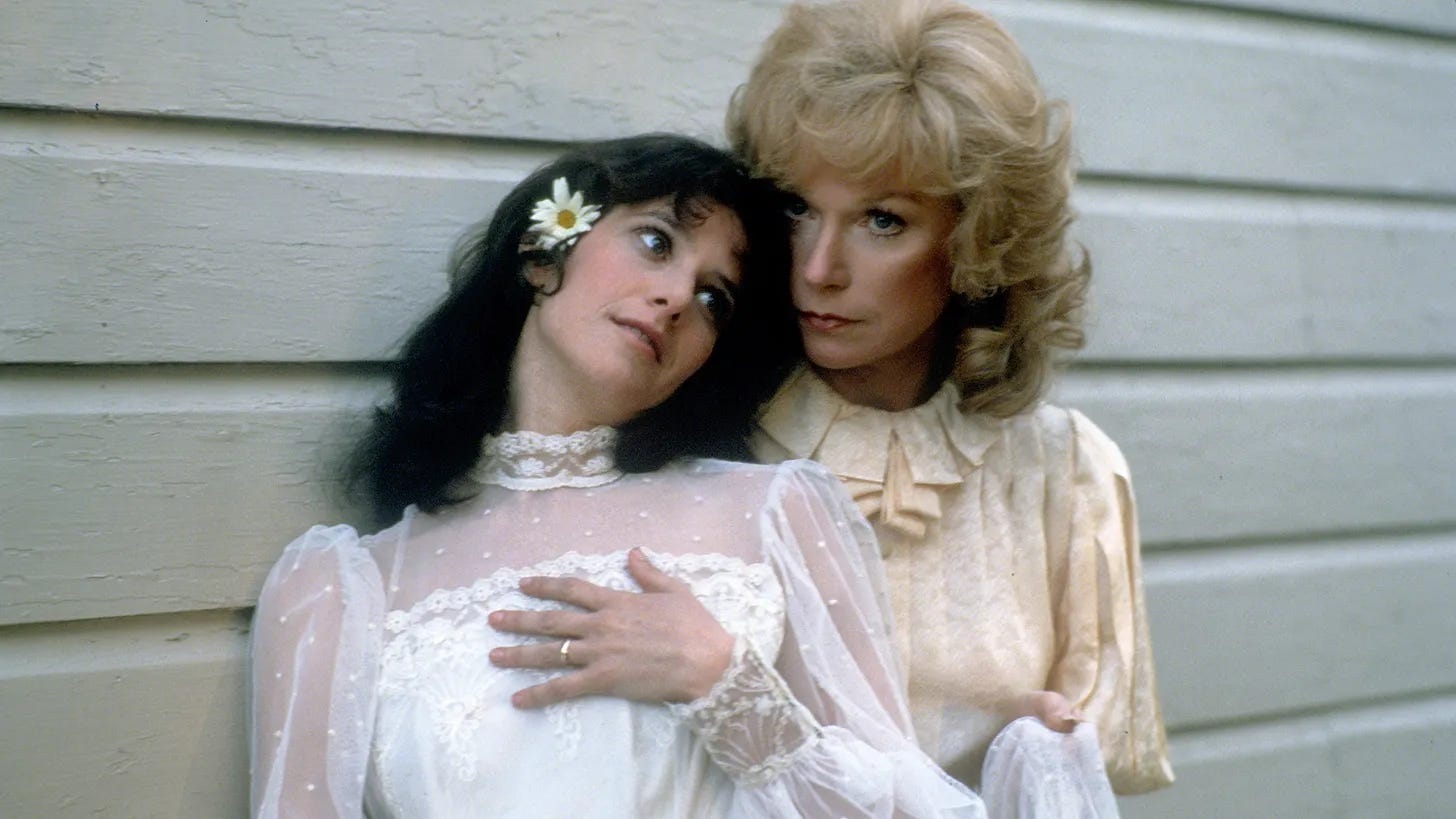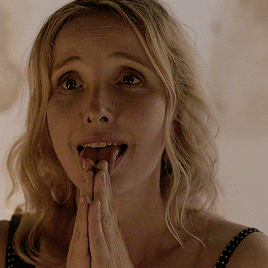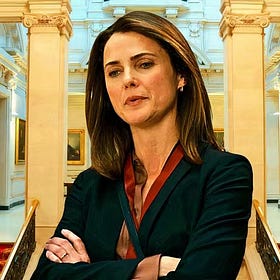Midlife Unstuck: Where Women’s Pauses Become Power
Dying for Sex, The Diplomat, On the Verge, Disclaimer, The Last Thing He Told Me, and Tiny Beautiful Things have all made my recent "zeitgeist of women in their middle years" watch list and here's why
The show, Fleishman is in Trouble, did a good job of depicting a certain malaise that sets in with women of a certain age and socio-economic stability, when they reach a heightened level of consciousness about their life, their sacrifices, and how one decision can close the door on a multitude of others.
In the show, Libby (played adeptly by Lizzy Caplan and which I expound upon here), the narrator, leaves a fledgling career, albeit a more open options existence as the sole female writer at a frat-mospheric, GQ men’s magazine stand-in, in NYC, sometime before settling into married life with lawyer, nice guy (Ted from HIMYM) in suburban NJ where she devotes her days to a steady schedule of kid pickups, meal times, kid play, and trying to care for her family. Libby is grieving a loss, but it is unclear what it is and how to label it.
It’s only now, in her early 40s, when the story picks up, and she reconnects with old college friends, that she starts to re-evaluate her life choices and dig into why she decided to forego her dreams of being a writer in the first place.
She lacks personal fulfillment. She misses the ease of youth and the freedom she perceives her male friends benefit from—one is separated from a spouse, with kids, and the other is single. Both guys are still living in NYC and retaining some shred of their former selves, even if just through the osmosis of being in the city.
The latent idea here is that by opening door #1 (husband, kids, big house, nice neighborhood, stability), she’s had to shut door #2 (excitement, uncertainty, carefree life, risk) - the one that afforded Libby the privilege of choice.
Libby is one of several portrayals on screen of women in their 40s wrestling with life choices, as representation of this period of life on screen has increased. The $900 million sale of Reese Witherspoon’s production company Hello Sunshine in 2021 highlights the strong demand for content centered on women’s stories, particularly those featuring women in or near middle age. Streamers like Hulu and Apple TV+ are investing in this market, with shows like Dying for Sex, The Morning Show, The Last Thing He Told Me, and Disclaimer, indicating a robust audience for stories about women of this demographic.

‘Nobody is sitting around thinking, what can I shoot in L.A. that’s going to have a 50-year-old woman in it?’ She’s [Reese] like, ‘You’ve got to create your own stuff,’” Garner says in an interview with The Hollywood Reporter. “All women in this town owe a debt of gratitude to Reese.”
Platonic Love Between Friends as Endgame
The newest addition to the “mid-life women in search of something more” trend is the Michelle Williams-produced, Dying for Sex [blurb here] on FX/Hulu, which follows the journey of a married woman named Molly, 42 years old and recently diagnosed with Stage IV metastatic breast cancer. It’s based on the real-life story of Molly Kochan, who passed away in 2019, and whose best friend, Nikki Boyer, an actress and podcaster, chooses to be Molly’s primary caregiver after she leaves her husband. In the show, Nikki (Jenny Slate) puts her life on hold, losing her job and her boyfriend in the process, to care for her best friend, Molly.

Molly’s rationale for leaving her husband, who treats her more like a patient than a spouse, is primarily rooted in her deep desire for sexual fulfillment and to experience her first orgasm before she dies. She’s on borrowed time, but does eventually find love and an orgasm with “Neighbor Guy” (Rob Delaney). They are ideally suited for one another as well. But even so, when he visits her in the hospital for the last time, telling her he’ll come back to visit her the next day, she declines his offer, telling him, “I want to get a dog with you. Not die with you.” After that, we never see or hear from him again, and it’s fitting. The love match here is between Nikki and Molly. As Molly tells her before she goes on sedation and leaves this world:
“You are my favorite person in the whole wide world.”
You know that Molly is Nikki’s too, not only because Nikki provides steadfast, unwavering emotional and physical support for Molly, but also because she tells her boyfriend Noah as much when she breaks up with him. Nikki ends the relationship after Noah turns off her phone to give her a break from caring for Molly following Molly’s oral surgery. Still, Nikki tells him quite rightly that he had no right to do that and that she loves Molly more than anyone, including him.
In a recent podcast episode of two other mid-life creative ladies, Liz Feldman (Creator of the best female friendship show ever, Dead to Me) and Jessi Klein (Producer on a ton of shows, including Inside Amy Schumer and Dead to Me), Bridget Everett, of Somebody Somewhere and the raison d'être for my alt-Golden Globe Awards this past year [seriously, check it out], talked with the co-hosts about her show and specifically the kinship between her character, Sam and Sam’s best friend Joel (Jeff Hiller).
Side note: Any Somebody, Somewhere fan will tell you this relationship was a key draw of the show, and in the same breath, that the most memorable line of the final season was when Joel turns to say and tells her, “You’re my person.” It was made that much more touching by the fact that Joel is in a happy and secure relationship with his partner, and yet he still recognizes that he won’t ever have another person like Sam - one with whom he can be his true self and be loved in all the ways that matter.
Molly’s relationship with her mom, Gail (Sissy Spacek, in fine form), is complicated and tense. Gail is a recovering addict, so Molly ended up being the parent even as a kid. On top of that, Molly was sexually abused by one of Gail’s boyfriends when she was young, and traumatic flashbacks haunt her. She carries the guilt and responsibility for what happened—a sadly common experience for victims. In many ways, their relationship reminded me of the tortured bond between Debra Winger and Shirley MacLaine in Terms of Endearment. In the end, Gail steps up for Molly, reversing roles so that the mother cares for her daughter as it always should have been. The fact that Molly, in her final days, is surrounded by the two women who shaped her life—that’s not just important, it’s everything.
Hollywood & The Big "C"
In the 2003 Canadian film, My Life Without Me, a seemingly healthy, young hard-working mother of two young children, Ann (Sarah Polley) is given the unfortunate news that she has advanced ovarian cancer. Ann decides to withhold this information from her young daughters and more surprisingly, her devoted husband, Don (Scott Speedman) and to make plans fo…
“For me, I’m never going to be there at the start of someone’s life, but I am going to be that at the end, and I’m just going to love this person right up until the end.” - Nikki in “Dying for Sex”
Female Friendship in Groups Greater than 2
Women of a certain age owe a debt of gratitude to actress Julie Delpy - the ultimate Gen-X thinking woman’s/ existential angsty film femme. In the 90s, contrary to popular opinion, Julie Delpy had me at “hello.” Not Tom Cruise in Jerry Maguire. Or Tom Cruise in anything, but I did enjoy Knight & Day (2010). Seriously, give the movie a whirl. It’s entertaining as heck. Anywho, back to Delpy… I first came upon her by watching French films with my brother in high school, specifically the trilogy (Trois Couleurs: Rouge, Bleu, Blanc) by Krzysztof Kieślowski. I was hooked by her ethereal lightness of being and how she could convey such depth in her expression and directness.
From there, Delpy went on to more commercial success when she was paired with the equally stunning Gen X emo-intellectual heartthrob, Ethan Hawke in Richard Linklater’s trilogy on a theme of a love match between two soulmates fated to spend eternity with one another - Before Sunrise (1995), Before Sunset (2004), and Before Midnight (2013)- where we got to bear witness to how a conversation, full of all the freedom and hope stuffed into a single night, can truly be a transformative experience. The films are an ode to chance, circumstance, and choice. The last one, in particular, has Delpy’s character, Celine, now middle aged, with kids and coupled with Hawke, wrestling with her feeling the inequity often present in being a caregiver (i.e. mom), having to choose between a career or kids, whereas Jesse (Hawke), the husband and father, hasn’t had to limit his choice or curb his ambition, and is a successful writer.
In many ways, Delpy, an accomplished director, singer, and screenwriter, in addition to her acting credits, could be channeling a “what if” version of Celine into her portrayal of Justine, in On the Verge (Netflix), where she plays a very successful French chef with her own posh LA restaurant and brand (and a book), who has the career but lacks the loving partnership, as her husband belittles her and is very envious of her success and this plays out in rather sadistic ways throughout 10 episodes. Her relationship with her son is a positive one, but she’s running herself ragged with pick-ups, exhausted, while her out-of-work husband blames her for taking them out of France, where he believes he could have been a renowned architect. Justine has the career (purpose) and is still seeking escape and seemingly stuck in a joyless marriage, begging the question of, “Can a woman really have it all?”
Rounding out the cast of female friends in the show, are Anne (Elizabeth Shue), a hippy, CBD gummy inhaling, heiress with her own clothing line and a gender fluid son, who has seemingly loving marriage, before her husband decides he’s unhappy with her one night after she jokingly mentions her friend’s unhappy marriage and then leaves her and her son and their nanny; Yasmin (Sarah Jones), an affluent mother and wife to a tech entrepreneur who has a back story because why else would the show spend so much time on some of the existential angst she has; and Ell (Alexia Landeau), a poor, single mom, who starts a hit YouTube show with her kids about a dysfunctional family.
Note: On the Verge is not of the caliber of Dead to Me in its deeper ride-or-die friendship vibe. Instead, it’s a quartet of unrelatable yet relatable, realistic yet utterly unreal women. It's like 'Real Housewives,' but with better lighting and editing, more cerebral women, and less Botox and filler.

“The Diplomat” Explores Power Dynamic Shifts in Marriage
Can former mouseketeer, Y2K pixie hair toting college student who was lovesick for Ben in Felicity, Keri Russell (The Americans) do any role half ass? I don’t think so. Her latest U.S. Netflix hit (not to be confused with the UK version on which it’s based), The Diplomat, features Russell starring as half of an ambassador powerhouse couple deployed to England to diffuse a potential landmine of warmongers posing as heads of state. Her husband is Hal Wyler, portrayed by Rufus Sewell (The Man in the High Castle), a charismatic, yet somewhat principled, former foreign policy mastermind/ambassador who is now playing second fiddle to Russell’s Kate. This is a role reversal and shift in power dynamic for the couple, as Kate has spent the better part of her career as Hal’s #2, helping him do his thing. She really wants to head up the U.S. presence in Kabul, and at the last minute, she’s appointed as the U.S. Ambassador to the UK (why? who knows), which she feels unprepared for and asks for Hal’s help, just until she gets her feet wet. This is England, so it could literally be a minute, and it should be a minute.
A Woman Makes the World A Safer Place, After Being Pretty Much Catfished by Husband
Adapted from the Laura Dave novel, The Last Thing He Told Me on Apple TV+, the new mystery drama about a woman, Hannah (Jennifer Garner), whose husband, Owen (Nikolaj Coster-Waldau) mysteriously disappears, leaving her to care for her teenage stepdaughter, Bailey (Anjourie Rice), in an Architectural Digest-grade Sausalito houseboat, and who wants nothing to do with her, is entertaining, at least.
Hannah, like Justine in On the Verge is a thriving artist. Here, it’s the oddly specific craft of woodcarving. She gets dismissive jokes on this occupation by Bailey, because Bailey tends to like to be mean to her and only likes her grilled cheeses. Point being, Hannah had a seemingly plentiful, less stressful life prior to Bailey and Owen, begging the question, was the 1-2 years of romantic love with hunky and dreamy Owen worth the cost of this shitstorm of a mess Owen’s left for her to clean up? The cynic in me thinks Hannah might be feeling the same question throughout the caper. As a caveat, I read the novel a few years ago, so seeing the story unfold on screen is a bit of an indulgence, and Garner is always in her element when playing physical, quick-thinking, and quick-acting roles (Sidney Bristow, Alias).
Like any good mystery, there’s some suspending belief elements, some defying any reason or logic, and odd memory reliance on the part of a teenager to basically solve the entire mystery based on a day she remembers in broken fragments from when she was between 3 and 5 or maybe 7. But yeah, if you can get over this, it’s exciting to see Garner/Hannah still have the action-packed moves after all the Alias years that have gone by.
“Tiny Beautiful Things” - An Ode to Motherless Daughters (We’re Here) & Super GenX Women Everything
In author Cheryl Strayed’s (Wild) show, Tiny Beautiful Things, Kathryn Hahn plays Clare, a talented writer, who doesn’t write anymore when the show starts, but works as an admissions officer in an assisted living facility and has am estranged husband (Danny) and a teenage daughter (Rae). Things aren’t great at home, and Clare stumbles upon a chance to reboot her life a bit when she’s offered a gig as an advice columnist for “Dear Sugar.” Through giving advice and receiving solicitations for help from her readers, she begins to heal and come to terms with her own life and her current situation.
Through a series of flashbacks and present time, we understand that Clare’s mom died when she was in her early 20s, and her brother is financially dependent on her to some degree. She still grieves her mom’s loss, feels responsible for her brother, and beats herself up about what a punk she was to her mom before her mom’s passing, even though there is nothing in her behaviour as exposed through the flashbacks that indicated Clare was hurtful or unkind - more so that she was acting like a normal teenager, ignorant of her mother’s imminent death, and had a pretty loving relationship with her.
Quote from Clare (on grief and loss): It is impossible for you to go on as you were before, so you must go on as you never have.
Clare is still recovering and mending from a type of grief that oozes at all the most inconvenient types and makes for a somewhat “shit-stirring” persona, but I’m here for it. She’s smart, vulnerable, and really needs to find a place to sleep that’s not an assisted living facility.
On a personal note, this show speaks to me as I am one of those women who lost their mother at a young age and work every day to navigate life, marriage, and motherhood in the absence of that attachment, in its severed state. I get that people have all kinds of complicated relationships with their mothers, and in some cases, choose to be estranged. It’s still not the same, as never having a way in your adult life to experience that person that brought you to life, ever again and to know that finality. There’s a type of pain to that that no one really gets unless they, too, have experienced it.
Unpacking Convenient Falsehoods & Tropes
The Inconvenient Truth of Women Like Catherine/Cate in "Disclaimer"
Spoilers for the series “Disclaimer” are below.










I loved this collection, Beth. I hadn't heard of On the Verge. I'm a huge Delpy fan.
Yes! That episode of Here to Make Friends with Bridgett Everett is so good!!!